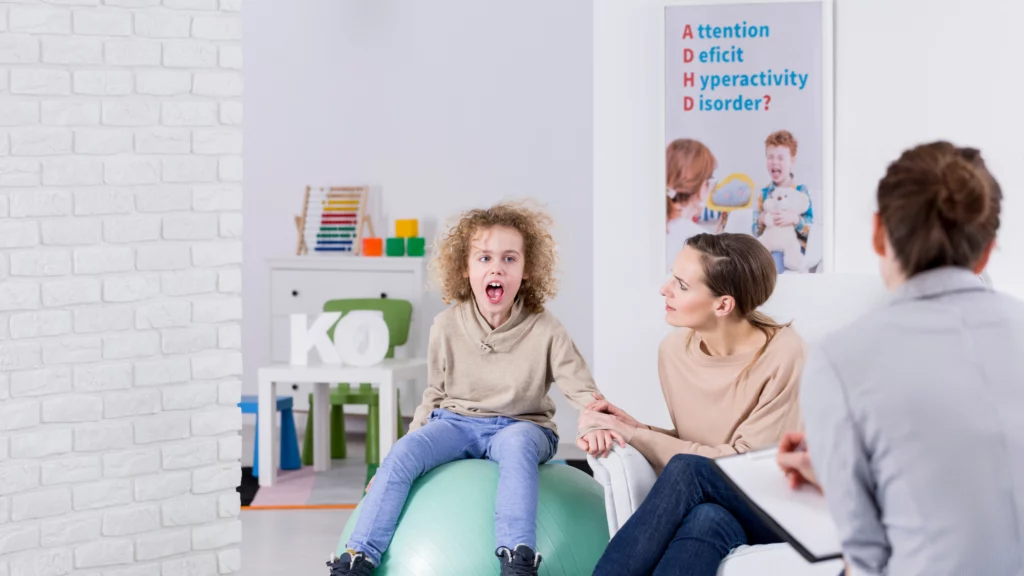What is ADHD?
Parenting is a tough job that requires patience, hard work and plenty of focus. But for parents with ADHD, the challenges can be even greater. ADHD, or attention-deficit/hyperactivity disorder, is a neurodevelopmental disorder that affects both children and adults, making it difficult to focus, control impulses and maintain motivation.
Symptoms of Attention Hyperactivity Deficit Disorder (ADHD) most commonly include hyperactivity which cannot fit with the environment and cause concern with executive functioning skills. Otherwise ordinary observances like academic success, relationships, and career achievement, can be affected by this condition. ADHD is also associated with low self-esteem in young people.
ADHD Symptoms in Mothers

The symptoms of ADHD in mothers can vary, but some of the most common ADHD signs include:
- Struggles with time management and organization
- Increased distractibility and forgetfulness
- Sleep disorders
- Procrastination and difficulty starting and finishing tasks
- Impulsivity and poor decision making/ conduct disorder
- Emotional dysregulation, including mood swings and irritability
- Trouble with social and interpersonal relationships
Mothers with ADHD may experience additional challenges due to their difficulty concentrating and the demands of their daily responsibilities. This can lead to feelings of stress, overwhelm, anxiety disorders and guilt. However, it is possible to effectively manage ADHD symptoms with lifestyle interventions, therapy, medication, and parenting techniques.
ADHD Symptoms in Children

ADHD symptoms in children typically present before the age of 12 and differ slightly from those in adults. Some of the most common signs and behaviors of ADHD in children include:
- Inattention or difficulty focusing on tasks
- Hyperactivity or restlessness
- Impulsivity or acting without thinking
- Struggles with organization and follow-through on tasks
- Forgetfulness or losing things frequently
- Interrupting others during conversations or activities
It is important to note that ADHD can present differently in boys and girls. Boys with ADHD symptoms may exhibit more hyperactive and impulsive behaviors, while girls with ADHD symptoms may exhibit inattention, disorganization, and forgetfulness.
This can lead to later diagnosis of persistent symptoms or misdiagnosis of ADHD symptoms present in girls, making it important to recognize these differences in presentation.
ADHD Diagnosis and Treatment
ADHD is typically diagnosed during childhood, with symptoms appearing around the age of six years old. The diagnosis of ADHD requires a comprehensive evaluation by a healthcare professional, including clinical evaluation, interviews with family members, and observation of symptoms.
ADHD diagnosis is made based on the criteria outlined in the Diagnostic and Statistical Manual of Mental Disorders (DSM-5) by the American Psychiatric Association.
The treatment of ADHD is individualized, and treating ADHD can involve various strategies, including medication, therapy, and lifestyle modifications.
Stimulant medications like Ritalin and Adderall are often used to improve focus and reduce hyperactivity symptoms of ADHD. Behavioral therapy and cognitive-behavioral therapy (CBT) can help develop coping mechanisms, improve social skills, and enhance executive function of those diagnosed with ADHD.
Various lifestyle modifications, including exercise, a healthy diet, organization skills, and structure, can also improve symptoms of ADHD.
Parenting With ADHD
For parents with ADHD, the challenges of balancing daily responsibilities like work, housework, and parenting can become overwhelming. With ADHD, Distractions can turn a simple task into an ordeal, and forgetfulness can cause missed appointments or forgotten tasks.
The good news is that there are steps that parents with ADHD can take to help them manage their symptoms and make life a little easier.
In this blog post, we will explore some tips and strategies that can make everyday life easier for parents with ADHD.
We’ll cover topics like creating a consistent routine, breaking down tasks into smaller steps, simplifying your environment, and using positive reinforcement with your ADHD child.
These actionable strategies can help you become more organized, focused and in control, which can make all the difference between a stressful day and a successful one when living and parenting with ADHD.
From One ADHD Parent to Another
As someone who has struggled with ADHD, I understand how challenging it can be to parent with this condition.
But I have also learned that it is possible to thrive with ADHD by using the right tools and strategies. In this post, I’ll share some of the tips and techniques that have helped me manage ADHD parenting while raising my own children.
If you’re looking for practical, actionable advice on managing ADHD and parenting, this post is for you.
Whether you’re a seasoned ADHD parent or just starting out, these tips and strategies can help you overcome everyday challenges and become a more focused and engaged parent – despite ADHD.
So let’s get started!
Managing Motherhood with ADHD: Tips and Strategies
Being a mom is challenging, even without an ADHD and mental disorders. But for mothers with ADHD, everyday tasks like keeping the house clean, sticking to a schedule, and running errands can be overwhelming.
However, there are many practical tips and strategies that can make life with ADHD easier. In this article, we’ll discuss some of the daily challenges that mothers with ADHD face and provide unique and practical solutions that can help improve their daily lives.
Everyday Challenges and Solutions
Maintaining a Clean Home When You Have ADHD
Keeping a tidy home when you have ADHD can feel like an uphill battle, but with a little effort, it is possible for this to improve your mental health.
-
Start small: Tackle one area at a time, whether it’s a single room or a section of a room. When you have ADHD, its important to not move on until the area is completed.
-
Enlist help: Divide household chores among family members and create a schedule. Children can be assigned age-appropriate tasks such as folding laundry, putting away toys, or wiping down surfaces. This will help your ADHD brain not feel so overwhelmed and aid in your overall mental health.
-
Create a daily cleaning ritual: Establish small daily tasks, such as cleaning dishes after meals or wiping down counters before bed. This helps keep ADHD symptoms AND your home manageable and prevents a build-up of mess.
Managing Time
Time management can be especially challenging for mothers with ADHD. Here are a few tips to help manage time and stay productive:
-
Use a planner or digital calendar app: The ADHD symptom I struggle with most is forgetfulness. Writing down appointments, meetings, and to-do lists in one centralized location helps with this specific (and annoying) ADHD symptom. Schedule reminders to go off throughout the day to keep you on track and combat ADHD symptoms and improve mental health.
-
Make a schedule and stick to it: When you have ADHD, consistency is key. Create a schedule for each day, including time for work, household tasks, self-care, and family time. Then watch your mental health improve.
-
Break down tasks into smaller parts: Larger tasks can be overwhelming for someone with ADHD, so break them down into smaller, more manageable steps.
Managing Career and Family
Many mothers with ADHD struggle with balancing their work and home lives without feeling overloaded. Consider the following to improve your mental health:
-
Work from home: If your job allows it, working from home can provide more flexibility and reduce stress levels of those with ADHD.
-
Get help with childcare: If you are a parent with ADHD, consider working out a schedule with other parents so that everyone gets a chance to focus on work, or take time for your own mental health while the children are supervised by responsible adults.
-
Prioritize self-care: Utilize breaks in the workday to do something enjoyable and switch your mind off work. Keeping youself stimulated will help with ADHD symptoms.
Managing Stress
Parenting is stressful, but mothers with ADHD can feel especially overwhelmed. Here are some practical ways to manage stress and your overall mental health:
-
Exercise: Exercise releases endorphins which help reduce stress, which is especially helpful for those with ADHD. Take up a physical activity that you enjoy and make it a part of your daily routine.
-
Practice mindfulness: Take a break to breathe, meditate, or do some yoga throughout the day. You will almost instantly find that this helps ADHD symptoms and your overall mental health tremendously.
-
Get enough sleep: This can be especially important since a lack of sleep can make ADHD symptoms worse.
Utilizing Technology
Technology can be a useful tool for those with ADHD to help in managing time, staying focused, and keeping track of tasks. Consider using the following:
-
Time tracking apps: Apps like Toggl can help ADHD users track how much time they spend on each task and identify any time-wasters.
-
Focus booster apps: The Pomodoro Technique can help improve productivity by breaking down tasks into 25-minute work intervals followed by 5-minute breaks. Apps like Focus@Will can also help keep those of us with ADHD focused by playing background music specifically designed to improve concentration.
Using Planners
Planners can be a lifesaver for mothers with ADHD, providing structure and guidance throughout the day. Here are some tips for using a planner:
-
Choose a planner that works for you: Whether you prefer a paper planner or a digital app, choose one that fits your personal style and needs. An aesthetically pleasing planner can be a great motivator for those with ADHD.
-
Keep it with you at all times: This will help you stay on top of appointments and tasks throughout the day – a key tool for those with ADHD.
-
Review and adjust regularly: Review your planner every morning and make any necessary adjustments to the schedule or tasks. This not only creates consistency for mothers with ADHD, but will help you hold yourself accountable.
Summary
Managing motherhood with ADHD can be challenging, but it’s important to remember that there are many resources available to help. By utilizing practical tips and strategies, mothers with ADHD can make small changes that add up to a better day for both themselves and their children.
Remember to take care of yourself, seek professional support when necessary, and use the resources available to you – including apps, planners, and other tools – to make life with ADHD easier.
Supporting Your Child with ADHD: Tips and Strategies for Parents
Parenting a child with ADHD can be a challenging journey. It can be difficult to navigate your child’s symptoms while still supporting their growth and development.
In this section of our blog post, we’ll discuss some practical tips and strategies that can help parents support their child with ADHD.
Everyday Challenges and Solutions
Creating Structure and Routine
Children with ADHD often struggle with structure,, and routine, which can lead to feelings of anxiety and overwhelm. Here are some tips for creating structure and routine in your child’s life:
-
Create a consistent schedule: Establish a routine for your child that includes a set sleep and wake-up time, meal times, and set blocks of time for homework or other tasks. This will allow their ADHD brain to adapt to a set of reliability.
-
Use visual aids: Visual aids like calendars, checklists, and schedules can help your child better understand and remember the routine, especially when they have ADHD.
-
Allow for breaks: It’s important to allow your ADHD child to take breaks and recharge throughout the day.
Establishing Positive Reinforcement Strategies
Positive reinforcement is a powerful tool for parents of children with ADHD. It helps to motivate your child and build their self-esteem. Here are some tips for using positive reinforcement:
-
Praise effort, not just results: Acknowledge your child’s effort, even if the results aren’t perfect. This will encourage them and build their self esteem, which children with ADHD may struggle with.
-
Be specific: When praising your child with ADHD, be specific about what they did well.
-
Set achievable goals: Set goals that are achievable for your ADHD child so that they can experience success regularly.
Developing Communication Techniques
Communication is an essential tool for parents of children with ADHD. Here are some tips for effective communication:
-
Use clear and concise language: When giving instructions, be clear and specific. Children with ADHD will also be able to better focus on what you are saying.
-
Listen actively: Show your child that you’re listening to them by making eye contact and asking clarifying questions. Not only will this build your ADHD Childs self esteem, but fuel their worth and allow them to feel truly seen and loved.
-
Stay calm: When communicating with your ADHD child, it’s important to stay calm and patient. This can be exceptionally difficuly if you are a parent struggling with ADHD yourself. It is important to seek professional help from someone who sepciallizes in ADHD to help you create a plan for when tempers start accelerating.
Utilizing Tools to Manage ADHD
There are many tools available to parents of children with ADHD. Here are a few that you may find helpful:
-
Exercise: Regular exercise can help children with ADHD better manage their symptoms. Try going for walks outdoors in nature, enrolling in community center sports programs, or encouraging dance parties in the kitchen.
-
Mindfulness: Mindfulness techniques like deep breathing and yoga can help children with ADHD stay calm and focused.
Finding a Balance
Finding a balance between supporting your ADHD child’s needs and empowering them to be independent can be challenging. Here are some tips to help you find that balance:
-
Encourage independence: Give your ADHD child autonomy in decision-making when appropriate. Ask them to pick the movie for movie night, or which game to play, what they would like to wear, or the music/audiobook to play in the car.
-
Stay supportive: Let your child know that you are there for them no matter what.
-
Take breaks: It’s important for parents (especially those with ADHD) to take breaks and recharge when feeling overwhelmed. This may include escaping to a designated area in the home, going for a walk, or hiding in the bathroom to breahe for several minutes.
Summary
Parenting a child with ADHD can be a challenging journey, but with the right tools and strategies, you can support your child while still maintaining a sense of balance in your own life.
Remember to create structure and routine for your ADHD child, use positive reinforcement, develop effective communication techniques, and utilize tools to manage symptoms.
Finding a balance between ADHD support and ADHD independence is key, and it’s important to take breaks and practice self-care when needed.
Above all, remember that you are not alone in this ADHD journey, and with patience, persistence, and support, you can help your child thrive.


